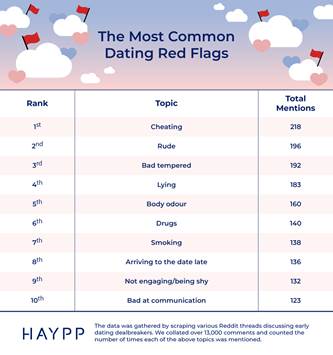Study reveals the most common dating red flags

Dating can be a wonderful experience, filled with excitement, anticipation and the thrill of getting to know someone. However, it comes with its own set of challenges, particularly when it comes to dealing with dating ‘red flags’.
A dating ‘red flag’ is something that is considered a deal breaker or a non-negotiable for a person. This can include poor hygiene, lateness, or even just spending too much time on the phone.
A new study conducted by Haypp has found the biggest dating turn-offs after analysing over 13,000 Reddit comments around dating ‘red flags’, with comments from both people in relationships and in the early stages of dating.
Out of the 30 ‘red flags’ analysed, cheating is revealed as the number one red flag for singletons across the UK. From the Reddit pages analysed, 218 comments mentioned words related to cheating and unfaithfulness.
This number also includes Redditors mentioning polyamory and casual or open relationships, which is a dealbreaker for most people on a first date who are looking for something serious.
With a rise in curiosity to open relationships, with almost a third of Brits (31%) considering it in the future, it seems honesty is the best policy when discussing your intentions with future dates as lying is the fourth-highest dating red flag after being mentioned 183 times.
Social etiquette is reflected highly in this study as ‘rude’, and ‘bad-tempered’ were the second and third most common red flags, mentioned 196 and 192 times respectively.
Likewise, ‘arriving to the date late’ ranked eighth in the study with 136 mentions, and ‘spending too much time on their phone’ was in the top 20 with 36 mentions.
Smoking in the UK dropped to its lowest level on record last year, so it’s no surprise to see it feature in the top 10 with 138 mentions. Unhealthy habits continue to feature in the study as drugs and excessive drinking rank sixth and 11th overall with 140 and 103 mentions respectively.
Interestingly, vaping was down at 26th in the list with only six mentions. Vape users have rapidly increased in the UK with over 40 percent of current and ex-smokers admitting to using e-cigarettes, which could contribute to its low scores as it’s now deemed more “socially acceptable”.
Hygiene also seems to be important for many, with 160 comments mentioning body odour and five mentioning bad breath.
Being able to talk to each other easily is understandably important. ‘Bad at communication’ was 10th in the list, featuring 123 times.
Many people say that confidence is an attractive personality trait, particularly for first impressions, so it’s unsurprising to see 132 comments mentioned issues related to the person not engaging/being shy on the date.
Markus Lindblad at Haypp Commented:
“It’s interesting to see what can be considered a ‘red flag’ when it comes to dating nowadays. While some are more niche than others, this study does highlight daters know what they want from a relationship and won’t settle for anything less.”






